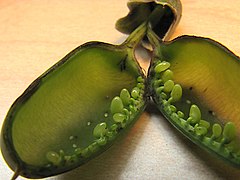Trichapion rostrum
Appearance
| Trichapion rostrum | |
|---|---|

| |
| Adult | |
| Scientific classification | |
| Domain: | Eukaryota |
| Kingdom: | Animalia |
| Phylum: | Arthropoda |
| Class: | Insecta |
| Order: | Coleoptera |
| Family: | Brentidae |
| Genus: | Trichapion |
| Species: | T. rostrum
|
| Binomial name | |
| Trichapion rostrum (Say, 1826)
| |
Trichapion rostrum, the baptisia seed pod weevil or wild indigo weevil, is a species of weevil in the family Brentidae.[1]
Description
[edit]Adult is entirely black. Its namesake elongated snout is called a rostrum, and has antennae attached near its base.[2]
Ecology
[edit]Adult females deposit eggs in seedpods of wild indigo (genus Baptisia) plants;[3] the larvae feed on seeds in the pods.[4][5]
Seed predation by weevils can adversely affect reproduction of the Baptisia host.[6] [7] [8]
-
Female ovipositing
-
Eggs
-
Larvae
References
[edit]- ^ "Trichapion rostrum (Baptisia Seed Pod Weevil)". iNaturalist.
- ^ "Trichapion rostrum (Say, 1826)". Symbiota Collections of Arthropods Network.
- ^ Whitehouse, Ryan J. (28 November 2018). "Trichapion rostrum (Say) (Brentidae: Apioninae) Infestation of Baptisia alba (L.) Vent. in Mississippi". Transactions of the American Entomological Society. 144 (3): 559–564. doi:10.3157/061.144.0306. S2CID 91872750.
- ^ "Species Trichapion rostrum - Wild Indigo Weevil". BugGuide. Iowa State University.
- ^ Downie, N.M.; Arnett, R.H. (1996). The Beetles of Northeastern North America, Vol. 1 and 2. Gainesville, FL: The Sandhill Crane Press. ISBN 1877743119.
- ^ Hembrough, Ashley M; Borowicz, Victoria (April 2017). "Pre-dispersal seed predation by the weevils Trichapion rostrum and Tychius sordidus limits reproductive output of Baptisia alba (Fabaceae)". Botany. 95 (8): 809–817. doi:10.1139/cjb-2016-0329.
- ^ Petersen, Chris E; Gibbs, Jessica L.; Hidalgo, George (2008). "Relationships Between Asynchronous Flowering by Baptisia alba (Fabaceae) and the Seed Predator, Apion rostrum (Coleoptera: Apionidae)" (PDF). The Great Lakes Entomologist. 41 (1–2). Michigan Entomological Society: 19–26.
- ^ Petersen, Chris E; Bauzys, Sharon M.; Speranske, Felicia A.; Petersen, Barbara A. (July–October 2012). "The Varying Phenology and Growth Patterns of Baptisia bracteata (Fabaceae) in Reconstructed Prairie" (PDF). Transactions of the Illinois State Academy of Science. 105 (3–4). Illinois State Academy of Science: 79–84.
External links
[edit] Media related to Trichapion rostrum at Wikimedia Commons
Media related to Trichapion rostrum at Wikimedia Commons Data related to Trichapion rostrum at Wikispecies
Data related to Trichapion rostrum at Wikispecies



